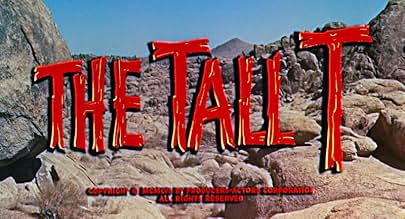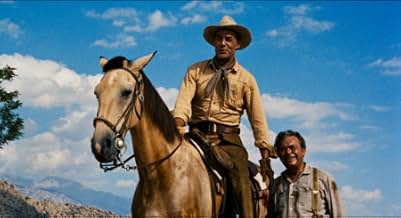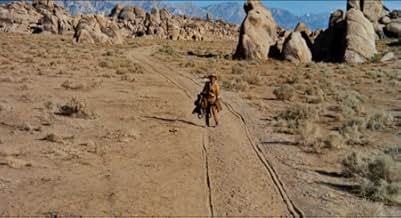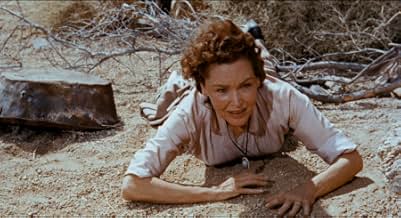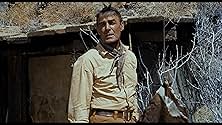VALUTAZIONE IMDb
7,3/10
6762
LA TUA VALUTAZIONE
Aggiungi una trama nella tua linguaAn independent former ranch foreman is kidnapped along with an heiress, who is being held for ransom by trio of ruthless outlaws.An independent former ranch foreman is kidnapped along with an heiress, who is being held for ransom by trio of ruthless outlaws.An independent former ranch foreman is kidnapped along with an heiress, who is being held for ransom by trio of ruthless outlaws.
- Regia
- Sceneggiatura
- Star
- Premi
- 1 vittoria in totale
Robert Anderson
- Jace
- (non citato nei titoli originali)
Dick Johnstone
- Townsman
- (non citato nei titoli originali)
Anne Kunde
- Townswoman
- (non citato nei titoli originali)
Christopher Olsen
- Jeff
- (non citato nei titoli originali)
Fred Sherman
- Hank Parker
- (non citato nei titoli originali)
Recensioni in evidenza
Borrowing elements from Stagecoach and Rawhide, The Tall T is one lean and mean collaboration from director Budd Boetticher and star Randolph Scott. It's one of the best of the seven films the two men did together in the Fifties.
Scott's lost a horse on a bet with his old boss Robert Burton and is walking back to his place, a good 15 miles carrying saddle and other western gear. A stagecoach stops and driver Arthur Hunnicutt offers him a lift. It's not the regular stagecoach run, it's been hired by John Hubbard for him and his wife Maureen O'Sullivan. She's the only child of a millionaire mine owner and Hubbard was the bookkeeper for her father. It's made quite obvious from the beginning this is not a love match.
When the stagecoach gets to a way station, it's been taken over by outlaws Richard Boone, Skip Homeier, and Henry Silva. They think it's the regular coach run, but when they hear how O'Sullivan's father is worth millions, they decide on a kidnap.
The T in The Tall T might just stand for tension because that's what the film bristles with. Once Scott, O'Sullivan, and Hubbard are taken prisoner, the film's suspense doesn't let up for a minute. Scott is at his most forthright as a western hero in The Tall T.
Homeier and Silva play their usual punk roles to perfection. Boone is lean and mean as their leader, a worthy adversary for Scott. Of course it's the other two with their more than human weaknesses that leads to their downfall.
The Tall T is one of the best of Randolph Scott's westerns required viewing if one calls thyself a Randolph Scott fan.
Scott's lost a horse on a bet with his old boss Robert Burton and is walking back to his place, a good 15 miles carrying saddle and other western gear. A stagecoach stops and driver Arthur Hunnicutt offers him a lift. It's not the regular stagecoach run, it's been hired by John Hubbard for him and his wife Maureen O'Sullivan. She's the only child of a millionaire mine owner and Hubbard was the bookkeeper for her father. It's made quite obvious from the beginning this is not a love match.
When the stagecoach gets to a way station, it's been taken over by outlaws Richard Boone, Skip Homeier, and Henry Silva. They think it's the regular coach run, but when they hear how O'Sullivan's father is worth millions, they decide on a kidnap.
The T in The Tall T might just stand for tension because that's what the film bristles with. Once Scott, O'Sullivan, and Hubbard are taken prisoner, the film's suspense doesn't let up for a minute. Scott is at his most forthright as a western hero in The Tall T.
Homeier and Silva play their usual punk roles to perfection. Boone is lean and mean as their leader, a worthy adversary for Scott. Of course it's the other two with their more than human weaknesses that leads to their downfall.
The Tall T is one of the best of Randolph Scott's westerns required viewing if one calls thyself a Randolph Scott fan.
8fs3
Boetticher and Scott spent the latter half of the 1950s making some terrific, adult, low-key Westerns, of which this stands as the best. Atmosphere, technical work and acting are all excellent, with interesting villain characterizations and a well-realized flawed hero in Scott.
Brutal and vivid, great-looking, and among Elmore Leonard's earliest writing work in the medium. Check out this classic, as well as the other films of the star and director (also the similar, excellent Gary Cooper/Anthony Mann teaming in the following year's Man of the West.)
Brutal and vivid, great-looking, and among Elmore Leonard's earliest writing work in the medium. Check out this classic, as well as the other films of the star and director (also the similar, excellent Gary Cooper/Anthony Mann teaming in the following year's Man of the West.)
This 1957 Western follows in the tradition of "Rawhide" (1951). Once again we find a group of people that are being held by a band of thieves while waiting for their next stage to rob. This time Randolph Scott has taken over the Tyrone Power role of the hero in the earlier film. Scott must wait for the appropriate opportunity to make his stand against the evil band of killers (Richard Boone, Skip Homeier, and Henry Silva). Maureen O'Sullivan (who once portrayed Tarzan's Jane of the movies) finds herself in the unusual role of portraying a "plain jane" who has recently married a scoundrel. The newlyweds are on their way to their honeymoon when they are captured by Boone and his gang of cut throats. O'Sullivan's husband tries to use his new wife and her father's fortune as a bargaining chip to buy his way out of his predicament...but the killers wind up killing him along with the stage station's owner and his son. The hapless victims all seem to be killed off one by one and thrown into a well. Margaret O'Sullivan's only hope is for Randy to somehow save her. Scott uses the gang's individual weaknesses to get the drop on them .... and what is to come is one of the most brutal Westerns made during that period of film making. This film serves as a transitional bridge between the old Ken Maynard (man in a white hat who only drinks milk) bloodless Western and the grimy, realistic sweat stained Spaghetti Western that is destined to come. A fine cast and a disciplined script makes it everything one could hope for in a Western!!!
There's nothing epic about this well-crafted, workman-like western, and that works in its favor. Randolph Scott is wonderful as the world-weary small-time rancher who's pursuing a better life at an age when most men in those days were either retired or dead. He meets his evil double in the guise of Richard Boone, who finds himself out of place with the heartless thugs he finds himself running with. It's his fate but he yearns for the life that Scott has chosen. Wonderful location work. Dialogue and action are used to service the story and that's all, as it should be. As fulfilling and satisfying a movie as a good serving of stew and a mug of hot coffee.
SPOILERS.
If you're attracted only to black-and-white dramas shot in the rain in Slovenia, you probably won't like this one.
It's a no-nonsense El Cheapo Western shot on a low budget, an elementary piece of exposition of masculine honor, with Boetticher, Scott, Kennedy, Richard Boone, and movie flats -- all at the top of their forms.
What distinguishes the half-dozen or so Westerns that came from Boetticher and Scott is not so much the plot, which is generally simple, but the slight twists in character and the occasional grace notes in the dialogue.
You have to love this dialogue. "Cookin'? That's WIMMIN's work!" And, said by Scott in all sincerity, "There are some things a man can't ride around." And, "There are ten head of wimmin for every man in Sonora. Course, most of them is just hurrah gals." And, "I'm not gonna get shot in the belly just 'cause you're feelin' sorry for yourself." And, "Why don't you just say it out in words?"
Basically the story has Scott and O'Sullivan (who, twenty years earlier had been Tarzan's delectable mate) held hostage by Boone and his two shallow young companions, Billy Jack (Skip Homeier) and Chink (Henry Silva). Boone, although a vicious murderer, is not entirely unsympathetic. He feels forced to "run with" these coarse companeros who live from moment to moment. They don't even know their own ages. They've been beaten and mistreated since they were kids. ("You run with them," says Scott reprovingly.) Boone, on the other hand, is sick of their talk about wimmin and such. He is lonely, has no family or wummin waiting for him. "Talk," he orders Scott at gunpoint, "about anything!" He dreams of someday having a spread of his own, with a couple of cattle, working the ground.
But the code -- I mean the movie code of the 1950s, not the Western code -- is an unforgiving one. He is, after all, a murderer. When O'Sullivan's cowardly new husband is given permission to ride off to freedom and desert his wife, Boone turns away and mutters, "Bust him, Chink." The coward's name is Willard Mimms -- Arthur Honeycutt draws out the vowel and imposes a dipthong on it when he pronounces the name -- "Mee-yums." We know Mimms is toast five seconds after we meet him.
Richard Boone is great as the heavy with the daydreams. In a particularly violent climax he is blinded by a shotgun, twirls around entangled in a burlap sheet, and collapses. Scott shows his range in this movie. He laughs at the beginning and becomes grim after being taken hostage. He even forcefully smothers O'Sullivan in passionate kisses. And I thought he only like horses and mules. Commanding too is the performance of Henry Silva, in pink shirt and suspenders. He's clever, the way a sewer rat is clever. He slouches when he walks, and he stands hipshot. His expression hardly ever varies. And his voice is matter of fact, even when he's eagerly anticipating dumping yet another body in the well.
It's quite a lot of fun, shot as it is in Movie Flats. That's Mount Whitney in the background, the highest peak in California's Sierra Nevada. The highest peak in the lower 48 for that matter.
If you're attracted only to black-and-white dramas shot in the rain in Slovenia, you probably won't like this one.
It's a no-nonsense El Cheapo Western shot on a low budget, an elementary piece of exposition of masculine honor, with Boetticher, Scott, Kennedy, Richard Boone, and movie flats -- all at the top of their forms.
What distinguishes the half-dozen or so Westerns that came from Boetticher and Scott is not so much the plot, which is generally simple, but the slight twists in character and the occasional grace notes in the dialogue.
You have to love this dialogue. "Cookin'? That's WIMMIN's work!" And, said by Scott in all sincerity, "There are some things a man can't ride around." And, "There are ten head of wimmin for every man in Sonora. Course, most of them is just hurrah gals." And, "I'm not gonna get shot in the belly just 'cause you're feelin' sorry for yourself." And, "Why don't you just say it out in words?"
Basically the story has Scott and O'Sullivan (who, twenty years earlier had been Tarzan's delectable mate) held hostage by Boone and his two shallow young companions, Billy Jack (Skip Homeier) and Chink (Henry Silva). Boone, although a vicious murderer, is not entirely unsympathetic. He feels forced to "run with" these coarse companeros who live from moment to moment. They don't even know their own ages. They've been beaten and mistreated since they were kids. ("You run with them," says Scott reprovingly.) Boone, on the other hand, is sick of their talk about wimmin and such. He is lonely, has no family or wummin waiting for him. "Talk," he orders Scott at gunpoint, "about anything!" He dreams of someday having a spread of his own, with a couple of cattle, working the ground.
But the code -- I mean the movie code of the 1950s, not the Western code -- is an unforgiving one. He is, after all, a murderer. When O'Sullivan's cowardly new husband is given permission to ride off to freedom and desert his wife, Boone turns away and mutters, "Bust him, Chink." The coward's name is Willard Mimms -- Arthur Honeycutt draws out the vowel and imposes a dipthong on it when he pronounces the name -- "Mee-yums." We know Mimms is toast five seconds after we meet him.
Richard Boone is great as the heavy with the daydreams. In a particularly violent climax he is blinded by a shotgun, twirls around entangled in a burlap sheet, and collapses. Scott shows his range in this movie. He laughs at the beginning and becomes grim after being taken hostage. He even forcefully smothers O'Sullivan in passionate kisses. And I thought he only like horses and mules. Commanding too is the performance of Henry Silva, in pink shirt and suspenders. He's clever, the way a sewer rat is clever. He slouches when he walks, and he stands hipshot. His expression hardly ever varies. And his voice is matter of fact, even when he's eagerly anticipating dumping yet another body in the well.
It's quite a lot of fun, shot as it is in Movie Flats. That's Mount Whitney in the background, the highest peak in California's Sierra Nevada. The highest peak in the lower 48 for that matter.
Lo sapevi?
- QuizAlthough playing the older man, Arthur Hunnicutt was in reality twelve years younger than Randolph Scott.
- BlooperAs Brennan rides into town, after the meeting with the station keeper and his son, he passes the stage, which is standing in the street. Behind the stage, in the street behind, there is a parked car.
- Citazioni
[last lines]
[Pat, to the weeping Doretta, after he has killed three murderous kidnappers]
Pat Brennan: Come on now. It's gonna be a nice day.
I più visti
Accedi per valutare e creare un elenco di titoli salvati per ottenere consigli personalizzati
- How long is The Tall T?Powered by Alexa
Dettagli
- Tempo di esecuzione
- 1h 18min(78 min)
Contribuisci a questa pagina
Suggerisci una modifica o aggiungi i contenuti mancanti


